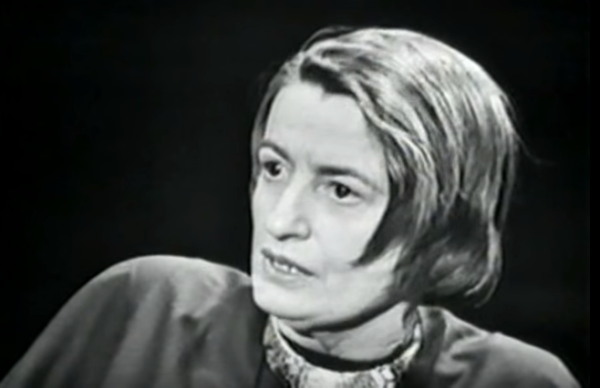When Ayn Rand Collected Social Security & Medicare, After Years of Opposing Benefit Programs
Josh Jones is a writer and musician based in Durham, NC. Follow him at @jdmagness
in Economics, Politics | December 27th, 2016 67 Comments

Image via YouTube, 1959 interview with Mike Wallace
A robust social safety net can benefit both the individuals in a society and the society itself. Free of the fear of total impoverishment and able to meet their basic needs, people have a better opportunity to pursue long-term goals, to invent, create, and innovate. Of course, there are many who believe otherwise. And there are some, including the acolytes of Ayn Rand, who believe as Rand did: that those who rely on social systems are---to use her ugly term---“parasites,” and those who amass large amounts of private wealth are heroic supermen.
Rand disciple Alan Greenspan, for example, initiated the era of “Reaganomics” in the early 1980s by engineering “an increase in the most regressive tax on the poor and middle class,” writes Gary Weiss, “the Social Security payroll tax—combined with a cut in benefits.” For Greenspan, “this was no contradiction. Social Security was a system of altruism at its worst. Its beneficiaries were looters. Raising their taxes and cutting their benefits was no loss to society.”
One problem with Rand’s reasoning is this: whether “parasite” or titan of industry, none of us is anything more than human, subject to the same kinds of cruel twists of fate, the same existential uncertainty, the same illness and disease. Suffering may be unequally distributed to a great degree by human agen you, but nature and circumstance often have a way of evening the odds. Rand herself experienced such a leveling effect in her retirement. After undergoing surgery in 1974 for lung cancer caused by her heavy smoking, she found herself in straitened circumstances.
Two years later, she was paired with social worker Evva Pryor, who gave an interview in 1998 about their relationship. “Rarely have I respected someone as much as I did Ayn Rand,” said Pryor. When asked about their philosophical disagreements, she replied, “My background was social work. That should tell you all you need to know about our differences.” Pryor was tasked with persuading Rand to accept Social Security and Medicare to help with mounting medical expenses.
I had read enough to know that she despised government interference, and that she felt that people should and could live independently. She was coming to a point in her life where she was going to receive the very thing she didn’t like.... For me to do my job, she had to recognize that there were exceptions to her theory.... She had to see that there was such a thing as greed in this world.... She could be totally wiped out by medical bills if she didn’t watch it. Since she had worked her entire life and had paid into Social Security, she had a right to it. She didn’t feel that an individual should take help.
Finally, Rand relented. “Whether she agreed or not is not the issue,” said Pryor, “She saw the necessity for both her and [her husband] Frank.” Or as Weiss puts it, “Reality had intruded upon her ideological pipedreams.” That's one way of interpreting the contradiction: that Rand’s philosophy, Objectivism, “has no practical purpose except to promote the economic interests of the people bankrolling it"---the sole function of her thought is to justify wealth, explain away poverty, and normalize the sort of Hobbesian war of all against all Rand saw as a societal ideal.
Rand taught “there is no such thing as the public interest,” that programs like Social Security and Medicare steal from “creators” and illegitimately redistribute their wealth. This was a "sublimely enticing argument for wealthy businessmen who had no interest whatever in the public interest.... Yet the taxpayers of America paid Rand's and Frank O'Connor's medical expenses." Randians have offered many convoluted explanations for what her critics see as sheer hypocrisy. We may or may not find them persuasive.
In the simplest terms, Rand discovered at the end of her life that she was only human and in need of help. Rather than starve or drop dead—as she would have let so many others do—she took the help on offer. Rand died in 1982, as her admirer Alan Greenspan had begun putting her ideas into practice in Reagan’s administration, making sure, writes Weiss, that the system was “more favorable to the creators and entrepreneurs who were more valuable to society," in his Randian estimation, "than people lower down the ladder of success.” After well over three decades of such policies, we can draw our own conclusions about the results.
Related Content:
Ayn Rand Helped the FBI Identify It’s A Wonderful Life as Communist Propaganda
Free Audio: Ayn Rand’s 1938 Dystopian Novella Anthem
In Her Final Speech, Ayn Rand Denounces Ronald Reagan, the Moral Majority & Anti-Choicers (1981)
Flannery O’Connor: Friends Don’t Let Friends Read Ayn Rand (1960)
Ayn Rand Argues That Believing in God Is an Insult to Reason on The Phil Donahue Show (Circa 1979)
Josh Jones is a writer and musician based in Durham, NC. Follow him at @jdmagness
Above is from: http://www.openculture.com/2016/12/when-ayn-rand-collected-social-security-medicare.html